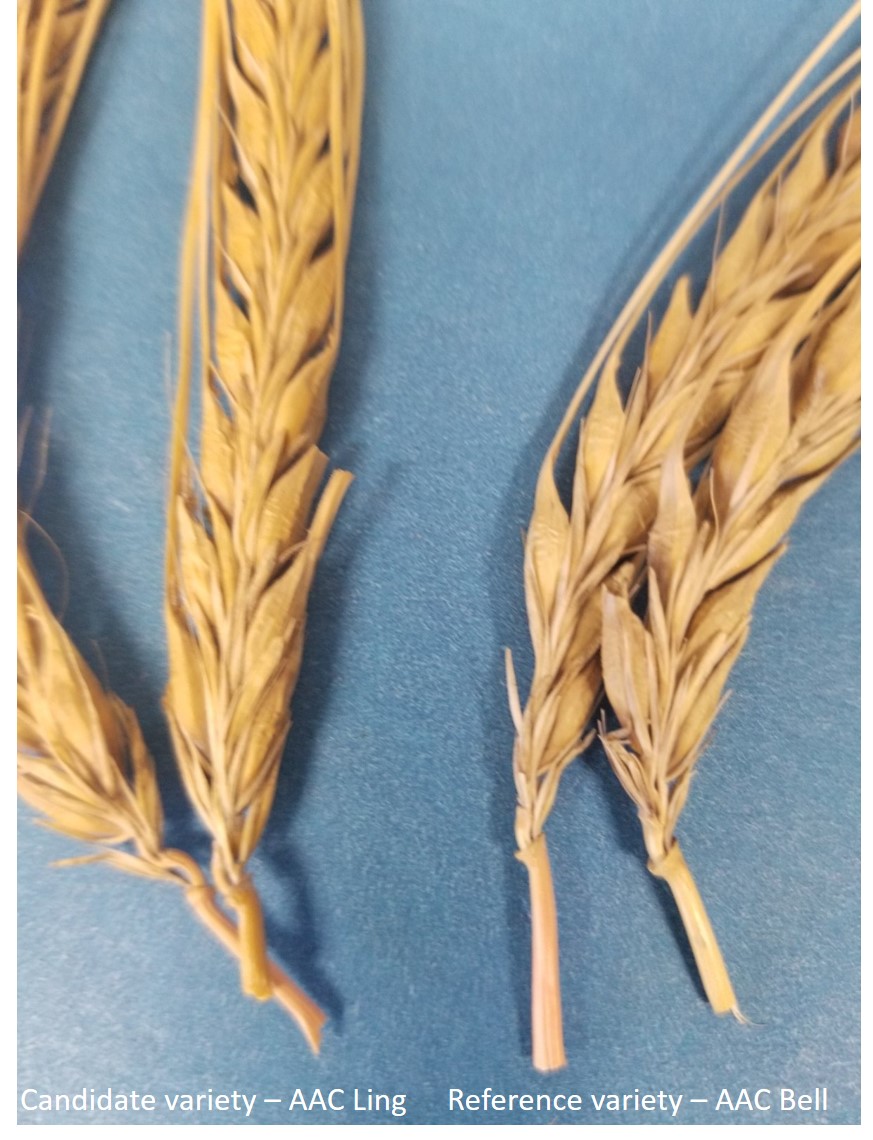AAC Ling
| Denomination: | 'AAC Ling' |
|---|---|
| Botanical Name: | Hordeum vulgare |
| Applicant/Holder: |
Agriculture & Agri-Food Canada, Ottawa Ottawa Research and Development Centre Room 1093A - 960 Carling Avenue Ottawa, Ontario K1A 0C6 Canada |
| Breeder: |
Raja Khanal, Agriculture & Agri-Food Canada, Ottawa, Ontario |
| Agent in Canada: |
Agriculture & Agri-Food Canada Office of Intellectual Property and Commercialization c/o Shannon Whyte 107 Science Place Saskatoon, Saskatchewan S7N 0X2 Canada Tel: (204) 999-9887 |
| Application Date: | 2018-07-10 |
| Provisional Protection:: | 2018-07-10 |
| Application Number: | 18-9573 |
| Grant of Rights Date: | 2022-09-07 |
| Certificate Number: | 6653 |
| Grant of Rights Termination Date: | 2042-09-07 |
Variety Description
Varieties used for comparison: 'Leader' and 'AAC Bell'
Summary: At booting, the flag leaf of 'AAC Ling' is wider than that of 'Leader'. The flag leaf auricles and lemma awn tips of 'AAC Ling' have anthocyanin colouration present whereas anthocyanin colouration is absent on the flag leaf auricles and lemma awn tips of 'Leader'. At ripening, the first segment of the rachis of 'AAC Ling' is long with a medium degree of curvature whereas it is medium in length with a weak degree of curvature for 'AAC Bell'. The rachilla hair on the kernel of 'AAC Ling' is long whereas it is short for 'AAC Bell'. 'AAC Ling' has incomplete horseshoe shaped basal markings on the kernel whereas 'AAC Bell' has transverse creased basal markings on the kernel.
Description:
YOUNG PLANT: erect growth habit at tillering, absent or very sparse pubescence on lower leaf sheaths
PLANT: two row, spring feed barley, spike emergence occurs mid-season
FLAG LEAF (AT BOOTING): very high frequency of plants with recurved flag leaves, sparse pubescence on blade
FLAG LEAF SHEATH: strong glaucosity, sparse pubescence
AURICLES: weak intensity of anthocyanin colouration, sparse pubescence on margins
SPIKE: weak to medium degree of glaucosity, semi-erect attitude, v-shaped collar, parallel shape, lax density, parallel to weakly divergent sterile spikelet attitude, glume and awn of the median spikelet are longer relative to the grain
LEMMA AWNS: medium intensity of anthocyanin colouration of tips, longer than spike, rough spiculations on margins
FIRST SEGMENT OF RACHIS: long, medium degree of curvature
KERNEL: whitish aleurone layer, long rachilla hairs, husk present, absent or very weak anthocyanin colouration of nerves of lemma, absent or very weak spiculation of inner lateral nerves of dorsal side of lemma, hairless ventral furrow, clasping disposition of lodicules, incomplete horseshoe shaped basal markings, medium to long, medium width
AGRONOMIC CHARACTERISTICS: good resistance to lodging, fair malting quality
Origin & Breeding History: 'AAC Ling' (experimental designation CH2720-5) originated from the cross between the varieties 'Leader' (female parent) and 'Pasadena' (male parent) conducted in 2006 at the Charlottetown Research and Development Centre, Harrington, Prince Edward Island, Canada. The F1 generation was grown in the field at Harrington in 2007. The plants were advanced using the bulk breeding method with the F2 to F4 bulks grown out in 2008 to 2010. Fifty four F4 heads were selected based on head type and grown out in head-rows. Nine F5 lines were selected for preliminary yield trials in 2013 with two of these lines advancing to the Maritime and Ontario Two-Row Barley Screening Trials in 2014. Based on grain yield, lodging and disease resistance, one line was designated as CH2720-5 and advanced to the Maritime and Quebec Two-Row Barley Registration and Recommendation Trials conducted in 2015 to 2017 and the Ontario Barley Orthogonal Trials in 2016 to 2017.
Tests & Trials: The comparative trials for 'AAC Ling' were conducted during the 2018 and 2019 growing seasons at the Agriculture and Agri-Food Canada Ottawa Research and Development Centre in Ottawa, Ontario, Canada. Each trial was arranged in a RCB design with 4 replicates and a seeding density of 350 seeds per squared metre. Plots consisted of 6 rows with a row length of 5 metres spaced 0.18 metres apart. Measured characteristics were based on 40 measurements per variety per year with the exception of 30 measurements in 2019 for the variety 'Leader'. Mean differences were significant at the 5% probability level based on a LSD values.
Comparison table for 'AAC Ling' with reference varieties 'Leader' and 'AAC Bell'
Flag leaf width (mm)
| 'AAC Ling' | 'Leader' | 'AAC Bell' | |
|---|---|---|---|
| mean 2018 (LSD=0.98) | 10.0 | 8.9 | 9.8 |
| std. deviation 2018 | 1.9 | 1.7 | 1.5 |
| mean 2019 (LSD=1.02) | 10.6 | 9.1 | 10.0 |
| std. deviation 2019 | 1.5 | 1.0 | 1.1 |
Click on image for larger view

Barley: 'AAC Ling' (left) with reference variety 'AAC Bell' (right)
- Date modified: